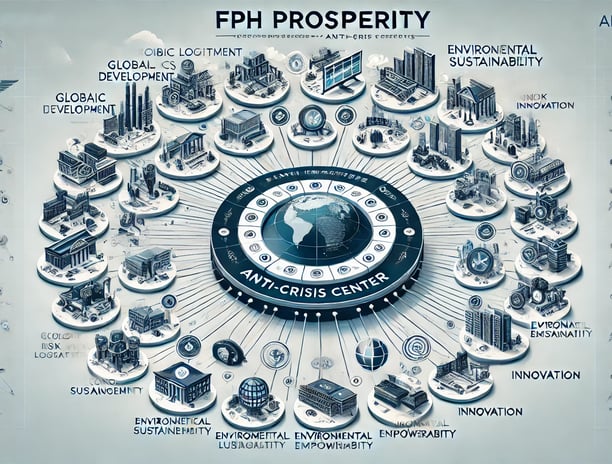FPH Prosperity Support Overview
We connect organizations with governments, fostering partnerships and driving sustainable development through specialized departments addressing key strategic areas.




Our Specialized Departments
Focusing on infrastructure, healthcare, education, and more, our departments ensure alignment with national priorities and promote innovation and resilience across regions.
About FPH Prosperity Support
FPH Prosperity Support – Anti-Crisis Center
A Global Response Platform for Sovereign Stability and Human Resilience
About the Anti-Crisis Center
In an increasingly volatile world marked by geopolitical shocks, economic collapse, environmental disasters, and social unrest, Future Progress Holding (FPH) has established the FPH Anti-Crisis Center (ACC) as a high-level command and coordination platform for governments and global institutions.
Functioning as the stabilization arm of Future Progress Holding Prosperity Support, the Anti-Crisis Center offers sovereign partners:
Early warning systems
Emergency funding deployment (XAU-backed)
Structural coordination across ministries
Technical taskforces and mobile recovery teams
Centralized response architecture integrated with global law
The ACC enables swift and structured interventions, ensuring no nation is left alone in times of institutional, economic, humanitarian, or environmental crisis.
The 17 Departments of Strategic Development
A Unified Engine for Sovereign Resilience
The ACC operates through 17 highly specialized departments — each one targeting a critical sector of national recovery, development, and transformation. Together, they form an interconnected architecture for systemic response and long-term progress.
Specialized Departments
World Logistics and Regional Integration Evaluates logistics infrastructure and readiness to expand FPH operations regionally and globally, ensuring seamless supply chain integration.
Global Economic Analysis and Strategy Development Conducts in-depth macroeconomic analysis to tailor strategies for economic recovery and growth in each operational region.
Financial Audit, Reporting, and Structure Development Reviews fiscal data to build transparent, optimized financial systems aligned with best practices and international standards.
Industry-Specific Technology and Innovation Hub Guides sector-specific innovations, ensuring each industry under FPH remains competitive and future-oriented.
Global Standardization and Quality Assurance Implements international quality protocols across departments and subsidiaries to maintain excellence in all deliverables.
Risk Management, Compliance, and Insurance Identifies vulnerabilities and establishes comprehensive mitigation strategies, including regulatory compliance and insurance solutions.
Human Resources, Community Development, and Social Welfare Promotes inclusive, equitable workforce development while implementing welfare programs and lifelong learning initiatives.
Information Technology, Data Integration, and Digital Systems Synchronizes FPH operations through digital platforms, ensuring secure data flow, software integration, and analytics.
Comprehensive Security and Risk Prevention Safeguards physical and digital assets through a multilayered approach to threat prevention and incident response.
Environmental Sustainability and Climate Responsibility Leads eco-initiatives across projects, from emissions reduction to biodiversity protection and clean energy transitions.
Global Banking, Investments, and Financial Empowerment Administers the Future Progress World Bank operations and manages inclusive investment strategies across all regions.
Budget Oversight and Financial Accountability Ensures strict adherence to budgeting protocols, conducts audits, and maintains financial discipline at every level.
Cultural Development and Cross-Regional Cohesion Strengthens local identities while promoting interregional unity through cultural exchange, heritage preservation, and creative projects.
Legal and Regulatory Affairs Monitors compliance across jurisdictions, defends intellectual property, and supports ethical governance structures.
Strategic Partnerships and International Relations Establishes global alliances and institutional cooperation, serving as the diplomatic and outreach engine of FPH.
Education, Training, and Knowledge Management Drives lifelong learning through formal education, vocational training, and internal knowledge management systems.
Innovation and Research & Development Pioneers advanced technologies and methodologies to secure FPH's leadership in future-driven global transformation.
Why These 17 Departments Matter
Each department is designed to operate independently, yet synergistically—together forming a government-level engine that enables:
Rapid national recovery
Cross-sector alignment
International donor integration
Localized implementation with measurable results
No one sector alone can solve a crisis — but a coordinated response from all 17 departments ensures a future-proof path to sustainable governance, stability, and progress.
Data-Driven | Sovereignty-Aligned | Humanitarian at Core
Every program deployed by the Anti-Crisis Center is:
Backed by real-time monitoring systems
Powered by FPH gold-based financial models
Deployed in coordination with national governments
Compliant with global regulatory standards
Focused on long-term prosperity, not temporary relief
Join the Global Resilience Architecture
The FPH Anti-Crisis Center invites participation from:
National Governments
Humanitarian Agencies
Central Banks & Sovereign Funds
International Organizations
Crisis-Affected States
Request a partnership briefing
Learn more at https://futureprogressholding.com/fph-anti-crisis-center
Align your country or institution with the 17-department response model
Future Progress Holding – Anti-Crisis Center
Stabilizing Nations. Supporting People. Sustaining Progress.
